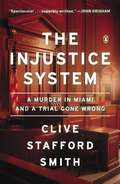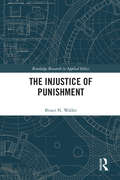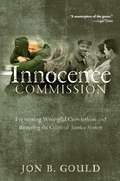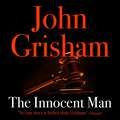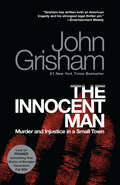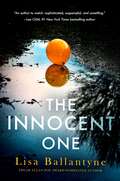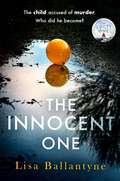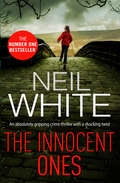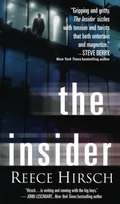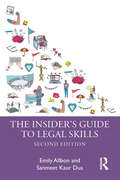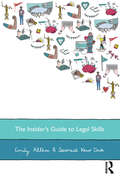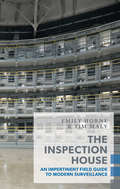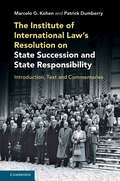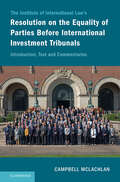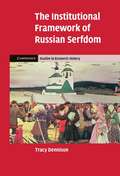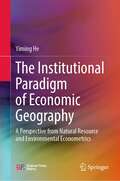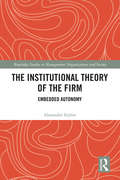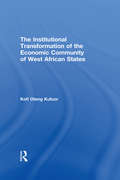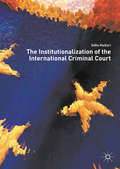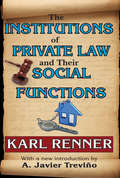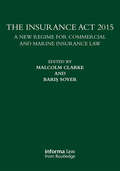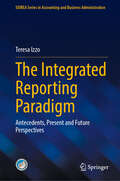- Table View
- List View
The Injustice System
by Clive Stafford SmithThe maverick public defender who inspired John Grisham tells the story of his most frustrating caseA man accused of a murder he didn't commit languishes on death row. A crusading lawyer is determined to free him. This powerful book reads like a page-turning legal thriller with one crucial difference: Justice is not served in the end.In 1986, Kris Maharaj was arrested in Miami for the murder of his ex- business partner. A witness swore he saw him pull the trigger and a jury found him guilty and sentenced him to death. But he swears he didn't do it. Twenty years later, he's bankrupted himself on appeals and been abandoned by everyone but his wife.Enter Clive Stafford Smith, a charismatic public defender with a passion for lost causes who calls up old files and embarks on his own investigation. It takes him from Miami to Nassau to Washington as he uncovers corruption at every turn. Step by step, Clive slowly dismantles the case, guiding us through the whole scaffolding of the legal process and revealing a fundamentally broken system whose goal is not so much to find the right man as to convict.A bombshell whose final chapter should re-open a long closed case, The Injustice System will appeal to fans of true crime and anyone who has served on a jury.
The Injustice of Punishment (Routledge Research in Applied Ethics)
by Bruce N. WallerThe Injustice of Punishment emphasizes that we can never make sense of moral responsibility while also acknowledging that punishment is sometimes unavoidable. Recognizing both the injustice and the necessity of punishment is painful but also beneficial. It motivates us to find effective means of minimizing both the use and severity of punishment, and encourages deeper inquiry into the causes of destructive behavior and how to change those causes in order to reduce the need for punishment. There is an emerging alternative to the comfortable but destructive system of moral responsibility and just deserts. That alternative is not the creation of philosophers but of sociologists, criminologists, psychologists, and workplace engineers; it was developed, tested, and employed in factories, prisons, hospitals, and other settings; and it is writ large in the practices of cultures that minimize belief in individual moral responsibility. The alternative marks a promising path to less punishment, less coercive control, deeper common commitment, and more genuine freedom.
The Innocence Commission: Preventing Wrongful Convictions and Restoring the Criminal Justice System
by Jon B. GouldBeyond Exonerating the Innocent: Author on WAMU RadioConvicted Yet Innocent: The Legal Times ReviewChoice Outstanding Academic Title for 2008DNA testing and advances in forensic science have shaken the foundations of the U.S. criminal justice system. One of the most visible results is the exoneration of inmates who were wrongly convicted and incarcerated, many of them sentenced to death for crimes they did not commit. This has caused a quandary for many states: how can claims of innocence be properly investigated and how can innocent inmates be reliably distinguished from the guilty? In answer, some states have created “innocence commissions” to establish policies and provide legal assistance to the improperly imprisoned.The Innocence Commission describes the creation and first years of the Innocence Commission for Virginia (ICVA), the second innocence commission in the nation and the first to conduct a systematic inquiry into all cases of wrongful conviction. Written by Jon B. Gould, the Chair of the ICVA, who is a professor of justice studies and an attorney, the author focuses on twelve wrongful conviction cases to show how and why wrongful convictions occur, what steps legal and state advocates took to investigate the convictions, how these prisoners were ultimately freed, and what lessons can be learned from their experiences.Gould recounts how a small band of attorneys and other advocates — in Virginia and around the country — have fought wrongful convictions in court, advanced the subject of wrongful convictions in the media, and sought to remedy the issue of wrongful convictions in the political arena. He makes a strong case for the need for Innocence Commissions in every state, showing that not only do Innocence Commissions help to identify weaknesses in the criminal justice system and offer workable improvements, but also protect society by helping to ensure that actual perpetrators are expeditiously identified, arrested, and brought to trial. Everyone has an interest in preventing wrongful convictions, from police officers and prosecutors, who seek the latest and best investigative techniques, to taxpayers, who want an efficient criminal justice system, to suspects who are erroneously pursued and sometimes convicted.Free of legal jargon and written for a general audience, The Innocence Commission is instructive, informative, and highly compelling reading.
The Innocent Man
by John GrishamJohn Grisham's first work of nonfiction, an exploration of small town justice gone terribly awry, is his most extraordinary legal thriller yet.In the major league draft of 1971, the first player chosen from the State of Oklahoma was Ron Williamson. When he signed with the Oakland A's, he said goodbye to his hometown of Ada and left to pursue his dreams of big league glory.Six years later he was back, his dreams broken by a bad arm and bad habits-drinking, drugs, and women. He began to show signs of mental illness. Unable to keep a job, he moved in with his mother and slept twenty hours a day on her sofaIn 1982, a 21-year-old cocktail waitress in Ada named Debra Sue Carter was raped and murdered, and for five years the police could not solve the crime. For reasons that were never clear, they suspected Ron Williamson and his friend Dennis Fritz. The two were finally arrested in 1987 and charged with capital murder.With no physical evidence, the prosecution's case was built on junk science and the testimony of jailhouse snitches and convicts. Dennis Fritz was found guilty and given a life sentence. Ron Williamson was sent to death row.If you believe that in America you are innocent until proven guilty, this book will shock you. If you believe in the death penalty, this book will disturb you. If you believe the criminal justice system is fair, this book will infuriate you.(P)2006 Random House, LLC
The Innocent Man: Murder and Injustice in a Small Town
by John Grisham#1 NEW YORK TIMES BESTSELLER • LOOK FOR THE NETFLIX ORIGINAL DOCUMENTARY SERIES • &“Both an American tragedy and [Grisham&’s] strongest legal thriller yet, all the more gripping because it happens to be true.&”—Entertainment Weekly John Grisham&’s first work of nonfiction: a true crime masterpiece that tells the story of small town justice gone terribly awry. In the Major League draft of 1971, the first player chosen from the state of Oklahoma was Ron Williamson. When he signed with the Oakland A&’s, he said goodbye to his hometown of Ada and left to pursue his dreams of big league glory. Six years later he was back, his dreams broken by a bad arm and bad habits. He began to show signs of mental illness. Unable to keep a job, he moved in with his mother and slept twenty hours a day on her sofa. In 1982, a twenty-one-year-old cocktail waitress in Ada named Debra Sue Carter was raped and murdered, and for five years the police could not solve the crime. For reasons that were never clear, they suspected Ron Williamson and his friend Dennis Fritz. The two were finally arrested in 1987 and charged with capital murder. With no physical evidence, the prosecution&’s case was built on junk science and the testimony of jailhouse snitches and convicts. Dennis Fritz was found guilty and given a life sentence. Ron Williamson was sent to death row. If you believe that in America you are innocent until proven guilty, this book will shock you. If you believe in the death penalty, this book will disturb you. If you believe the criminal justice system is fair, this book will infuriate you.Don&’t miss Framed, John Grisham&’s first work of nonfiction since The Innocent Man, co-authored with Centurion Ministries founder Jim McCloskey.
The Innocent One: A Novel
by Lisa BallantyneHe was a child who was accused of murder. Who did he become when he grew up? A gripping, thought-provoking thriller from the internationally bestselling author of Everything She Forgot.Innocent? Ten years have passed, but everyone remembers The Angel Killer. Sebastian Croll was just eleven years old when accused of murdering his playmate. Criminal attorney Daniel Hunter helped prove Sebastian's innocence in a trial that gripped the nation—and now the past is being unearthed when he gets a call from his old client. Or guilty? Sebastian's university professor has been brutally murdered—and everyone who knew her is in the frame of suspicion. As Daniel steps in to represent Sebastian for a second time, news about the boy's past spreads like wildfire, instantly branding Sebastian as guilty. With tensions around the country rising, can Daniel prove once again that Sebastian is the innocent one? Especially when he realizes that it's not just Sebastian who is in danger, but himself . . .
The Innocent One: The gripping new thriller from the Richard & Judy Book Club bestselling author
by Lisa BallantyneTHE CHILD ACCUSED OF MURDER. WHO DID HE BECOME?'Thought provoking and unsettling' Alex Gray'Had me turning the pages late into the night' C. J. Cooper'Gripping, twisty' Karen Dionne'An emotionally charged, nerve-jangling thriller' Saskia Sarginson________InnocentTen years ago, Sebastian Croll was found not guilty of murdering his playmate.Criminal solicitor Daniel Hunter defended the eleven-year-old in a trial that gripped the nation, but the past is unearthed when Daniel gets a call from his old client.Or guilty?Sebastian's university professor has been brutally murdered and everyone who knew her is in the frame. As Daniel steps in to represent Sebastian for the second time, rumour of his client's identity spreads like wildfire.The media swarm. Threats begin to arrive. And the question on everyone's lips:Could the child once accused of murder really be innocent?________What everyone is saying about Lisa Ballantyne's thrillers:'Gripping' Clare Mackintosh'Sophisticated, suspensefu' Lee Child'Tense' Sunday Times'Unsettling and compulsive' Rosamund Lupton'Moving' Guardian'Emotionally intense' Richard & Judy Book Club'Grips like a vice' Daily Mail'Thought-provoking' Gilly Macmillan'Tense' Rachel Abbott'A page-turner' Daily Express'I couldn't get this book out of my head' Jenny Colgan
The Innocent Ones (Dan Grant and Jayne Brett Series)
by Neil WhiteA lawyer and his investigator must uncover a secret worth killing for after a reporter is murdered in this tense legal thriller. By day, the park rings with the sound of children&’s excited laughter. But in the early hours of the morning, the isolated playground is cloaked in shadows—the perfect hiding place to conceal a brutal murder. When London journalist, Mark Roberts, is found battered to death, the police quickly arrest petty thief, Nick Connor. Criminal defense lawyer, Dan Grant, along with investigator Jayne Brett, are called to represent him—but with bloody footprints and a stolen wallet linking him to the scene, this is one case they&’re unlikely to win. Until help comes from an unlikely source . . . when the murder victim&’s mother says that Connor is innocent, begging Dan and Jayne to find the real perpetrator. Unravelling the complex case means finding the connection between Mark&’s death and a series of child murders in Yorkshire over twenty years ago. Father of two, Rodney Walker, has spent years in prison after being convicted of killing of 6-year-old William and seven-year-old Ruby back in 1997. But when Mark Roberts gets on the trail of the story, convinced that Walker is innocent, he exposed secrets that have long been buried. Secrets so dark, someone will kill to keep them hidden. Dan and Jayne are in a race against time to uncover the truth—before a killer silences them forever. Praise for the writing of Neil White&“A lively, accurate and absolutely compelling legal thriller; stand-out in both its prose and its plot. The characters are still with me, two days after finishing it. I couldn&’t put it down.&” —Gillian McAllister, Sunday Times-bestselling author of Everything but the Truth &“A tense and exciting crime thriller.&” —Rachel Abbott, author of Sleep Tight and And So It Begins&“One of the best writers of legal thrillers out there.&” —David Jackson, author of Don&’t Make a Sound and A Tapping At My Door
The Insider
by Reece HirschAn explosive debut thriller First corporate attorney Will Connelly's colleague hurtles to his death outside his office window. Within days, Will is a prime suspect in a murder, the target of an S.E.C. insider trading investigation, and a pawn in a complex criminal scheme involving the Russian mafia and a ruthless terrorist plot. Now, to top things off, he must ensure a deadly enemy doesn't gain access to the nation's most sensitive and confidential information-that has the power to do incalculable, irrevocable harm.
The Insider's Guide to Legal Skills
by Emily Allbon Sanmeet Kaur DuaConfused by cases? Stuck on statutes? Or just unsure where to start with writing, research or revision? The Insider’s Guide to Legal Skills will show you what you need to succeed, applying skills in their real-world context and helping you get to grips with legal method and thinking. Making use of problem-based learning and examples throughout, the fully updated second edition of this practical and accessible guide will provide you with a clear guide to skills within the law degree, including online learning. It will show you how to make the most of these skills in assessment and also help you to see their importance to a future legal career. Designed for students who want a clear overview of what a law degree is all about, the book has been built on the skills curriculum, and is a suitable text for Legal Skills, Methods and Reasoning courses as well as a general introduction to law, or pre-reading for those considering a law degree.
The Insider’s Guide to Legal Skills
by Emily Allbon Sanmeet Kaur DuaConfused by cases? Stuck on statutes? Or just unsure where to start with writing, research or revision? The Insider’s Guide to Legal Skills will show you what you need to succeed, applying skills in their real-world context and helping you get to grips with legal method and thinking. Making use of problem-based learning and examples throughout, this practical and accessible guide will provide you with a clear guide to skills within the law degree and how to make the most of them in assessment, but also help you to see their importance to a future legal career. Designed for LLB/GDL students who want a clear overview of what a law degree is all about, the book has been built on the skills curriculum, and is a suitable text for Legal Skills, Methods and Reasoning courses as well as a general introduction to law, or pre-reading for those considering a law degree.
The Inspection House: An Impertinent Field Guide to Modern Surveillance (Exploded Views)
by Emily Horne Tim MalyIn 1787, British philosopher and social reformer Jeremy Bentham conceived of the panopticon, a ring of cells observed by a central watchtower, as a labor-saving device for those in authority. While Bentham's design was ostensibly for a prison, he believed that any number of places that require supervision--factories, poorhouses, hospitals, and schools--would benefit from such a design. The French philosopher Michel Foucault took Bentham at his word. In his groundbreaking 1975 study, Discipline and Punish, the panopticon became a metaphor to describe the creeping effects of personalized surveillance as a means for ever-finer mechanisms of control. Forty years later, the available tools of scrutiny, supervision, and discipline are far more capable and insidious than Foucault dreamed, and yet less effective than Bentham hoped. Shopping malls, container ports, terrorist holding cells, and social networks all bristle with cameras, sensors, and trackers. But, crucially, they are also rife with resistance and prime opportunities for revolution. The Inspection House is a tour through several of these sites--from Guantánamo Bay to the Occupy Oakland camp and the authors' own mobile devices--providing a stark, vivid portrait of our contemporary surveillance state and its opponents.
The Institute of International Law's Resolution on State Succession and State Responsibility: Introduction, Text and Commentaries
by Patrick Dumberry Marcelo G. KohenMarcelo Kohen and Patrick Dumberry explore in an article-by-article commentary the Resolution adopted in 2015 by the Institute of International Law, on state succession in matters of state responsibility. They analyse the content and scope of application of each provision based on a comprehensive survey of existing state practice and judicial decisions (both domestic and international), as well as taking into account the works of scholars and that of the ILC Special Rapporteur in his proposed Draft Articles on the same topic. This book explains the rationale and the reasons behind why the Institute adopted specific solutions to address particular problems of succession to responsibility for each provision, including the need to achieve a fair outcome given the specific circumstances and relevant factors for each case.
The Institute of International Law's Resolution on the Equality of Parties Before International Investment Tribunals: Introduction, Text and Commentaries
by Campbell McLachlanThe Institute of International Law's 2019 Resolution on the Equality of Parties before International Investment Tribunals represents a major step forward in codification of this essential principle as it applies to investor-state dispute settlement: a principle whose application in this context has attracted increasing controversy in recent years. In this commentary, Campbell McLachlan, who served as the Institute's Rapporteur on the topic, explains the context for the Resolution and sets forth an article-by-article analysis of its provisions, drawing upon a wealth of prior case-law as well as the discussions within the Institute that led to the Resolution. The resulting text is designed to assist counsel and tribunals in investment cases, as well as contribute to the wider debate on the reform of investor-state dispute settlement.
The Institutional Effects of Executive Scandals
by Brandon RottinghausWatergate, Iran-Contra, Lewinsky, Enron, Bridgegate: according to the popular media, executive scandals are ubiquitous. Although individual scandals persist in the public memory and as the subject of academic study, how do we understand the impacts of executive indiscretion or malfeasance as a whole? What effect, if any, do scandals have on political polarization, governance, and, most importantly, democratic accountability? Recognizing the important and enduring role of scandals in American government, this book proposes a common intellectual framework for understanding their nature and political effects. Brandon Rottinghaus takes a systematic look the dynamics of the duration of scandals, the way they affect presidents and governors' capacity to govern, and the strategic choices executives make in confronting scandal at both the state and national levels. His findings reveal much about not only scandal, but the operation of American politics.
The Institutional Framework of Russian Serfdom
by Tracy DennisonRussian rural history has long been based on a 'Peasant Myth', originating with nineteenth-century Romantics and still accepted by many historians today. In this book, Tracy Dennison shows how Russian society looked from below, and finds nothing like the collective, redistributive and market-averse behaviour often attributed to Russian peasants. On the contrary, the Russian rural population was as integrated into regional and even national markets as many of its west European counterparts. Serfdom was a loose garment that enabled different landlords to shape economic institutions, especially property rights, in widely diverse ways. Highly coercive and backward regimes on some landlords' estates existed side-by-side with surprisingly liberal approximations to a rule of law. This book paints a vivid and colourful picture of the everyday reality of rural Russia before the 1861 abolition of serfdom.
The Institutional Paradigm of Economic Geography: A Perspective from Natural Resource and Environmental Econometrics
by Yiming HeThis groundbreaking book offers a comprehensive and contemporary analysis of the major areas of institutional economic geography. Each chapter discusses in detail the new developments and changes in the field, and with a balance of theory, applications and empirical tests provides a rigorous grounding in the economic analysis of the natural resources and environmental issues that are increasingly prominent policy concerns. The book is a must-read for any social scientist interested in real-world economic geography and institutional economics, including economists, political scientists, sociologists, historians, geographers and anthropologists.
The Institutional Structure of Macroprudential Policy in the UK (Studies in European Economic Law and Regulation #26)
by Kosmas KaprinisMacroprudential policy (MPP) has been one of the major initiatives in the post-2008 crisis restructuring of financial regulation. Under the macroprudential mandate, the regulator monitors and judiciously controls systemic risk in the financial system, in an attempt to minimise the probability and severity of a future financial crisis. The book reveals why MPP authorities are rightfully at the centre of a highly sensitive policy debate, as MPP necessitates the allocation of significant regulatory power to technocrats, while the highly technical nature of MPP makes policy evaluation challenging. Specific issues examined include: the importance of financial stability as a public policy goal; the political economy issues stemming from the delegation of MPP to an independent authority; and the definition of accountability in the context of MPP. Focusing on a case study on the Financial Policy Committee of the Bank of England, the macroprudential authority in the UK, the book develops the normative grounds to justify the need for accountability in the conduct of MPP, while also formulating the necessary institutional framework to ensure the accountability of MPP authorities.
The Institutional Theory of the Firm: Embedded Autonomy (Routledge Studies in Management, Organizations and Society)
by Alexander StyhreThe Institutional Theory of the Firm examines recent and previous organization theory literature to advocate what Evans (1995) refers to as the "embedded autonomy" of the firm, as well as its role in being simultaneously anchored in, for example, corporate legislation and regulatory practices on the national, regional (i.e., within the European Union) and transnational levels, while at the same time being granted the right to operate with significant degrees of freedom within this legal-regulatory model. Seen in this view, the embedded autonomy of the corporation represents a theoretical view of the corporation that complements the market-based image of the corporation in economic theory. When advocating the institutional theory model, three forms of embedded autonomy are examined. First, the corporation is enacted as a legal entity sui juris—as a freestanding "legal person" in corporate law and within the regulatory framework that serves to enforce legislation in everyday life settings. Second, the corporation is embedded within what social theorists refer to as moral economies, the norms and values that regulate what are the socially acceptable and legitimate means for conducting business. Third and finally, the corporation is embedded in governance, a relatively complex economic concept that denotes legal and regulatory control on the societal and economic system levels, and on the level of the individual corporation. By combining the three forms of embeddedness, sanctioned by law, norms, and governance, the embedded autonomy of the firm is secured on the basis of a variety of social practices and resources. This book brings together a diverse literature including management studies, economic sociology, legal theory, finance theory, and mainstream economic theory to advance the argument that the corporation is best understood as what is embedded in a social and economic context, yet best serving its defined and stipulated ends by assuming considerable degrees of freedom to operate in isolation from various stakeholders. It will be of relevance for a variety of readers, including graduate students, management scholars, policy-makers, and management consultants interested in organization theory and management studies.
The Institutional Transformation of the Economic Community of West African States
by Kofi Oteng KufuorThis book examines regional economic integration in West Africa within the context of the institutional evolution of the Economic Community of West African States (ECOWAS). It uses the tools of the New Institutional Economics School (NIE) to explore the origins and development of the most recent ECOWAS Treaty. Particular attention is given to the interface between domestic legal arrangements and the success of open markets at the regional and international levels.
The Institutionalization of the International Criminal Court
by Salla HuikuriThis book explores the institution of the International Criminal Court (ICC) as a policy instrument. It argues that after the Cold War the European Union started challenging the unilateral policies of the United States by promoting new norms and institutions, such as the ICC. This development flies in the face of traditional explanations for cooperation, which would theorize institutionalization as the result of hegemonic preponderance, rational calculations or common identities. The book explains the dynamics behind the emergence of the ICC with a novel theoretical concept of normative binding. Normative binding is a strategy that provides middle powers with the means to tie down the unilateral policies of powerful actors that prefer not to cooperate. The idea is to promote new multilateral norms and deposit them in institutions, which have the potential to become binding even on unilateralist actors, if the majority of states adhere to them.
The Institutions of Private Law and Their Social Functions
by Eli GinzbergIn the English-speaking world, Karl Renner is by far the best-known among the Austro-Marxists who were active in the Austrian socialist movement during the first few decades of the twentieth century. Recognition of Renner's scholarship is due largely to the English translations of his works on Marxism, as well as to the secondary writings on his notions of socialist legality and national cultural autonomy.Renner has for over half a century been celebrated for the only book of his that has, to date, been wholly translated into English. It remains the classic socialist attempt to off er a realistic understanding of the role of the legal institution of private property in modern society: The Institutions of Private Law and Their Social Functions. In his introduction to this edition, A. Javier Trevii?1/2o discusses the volume's relevance for today, and briefly describes that aspect of Renner's life that occupied most of this time and energy: his involvement in Austrian social democratic politics.The substance of Renner's exposition remains intact. The text provides one of the best insights into the relationship between capitalism and property's economic functions. It emphasizes how this fundamental institution's application has, since the initial stage of finance capitalism, increased or diminished, been externally transformed, or inherently metamorphosed. In an age of unprecedented global financial crisis, emerging market countries, and increased government regulation, Trevii?1/2o suggests we would do well to heed the book's message. It might help us understand the complex situations we encounter today as we grapple with our hybrid identities as salaried workers and economic investors.
The Insurance Act 2015: A New Regime for Commercial and Marine Insurance Law
by Malcolm Clarke Baris SoyerThe Insurance Act 2015 represents the first major reform of English commercial insurance law for many years. Its impact will be felt not only in England, where it will greatly affect both maritime and commercial insurance practice, but also elsewhere where English law is the law of choice in insurance contracts. The Insurance Act 2015: A New Regime for Commercial and Marine Insurance Law analyses in depth the key aspects of the Act and extensively restates and modifies a number of legal principles applying both at common law and under the Marine Insurance Act 1906. Offering much more than the usual commentary on legislation, this book provides critical in-depth analysis of the important topics as was all coverage of areas likely to spawn disputes in future. Written by leading practitioners and academics in the field, this book offers comprehensive, coherent and practical legal analysis of the changes introduced by the Insurance Act 2015. It is a key point of reference for practitioners, insurance professionals and academics.
The Integrated Reporting Paradigm: Antecedents, Present and Future Perspectives (SIDREA Series in Accounting and Business Administration)
by Teresa IzzoIntegrated reporting (IR) has emerged as an accounting change initiative and has rapidly gathered worldwide attention. Great expectations are placed in IR becoming the ultimate tool to secure valuable strategy and business model of disclosure. Although often attributed to the sustainability domain, this topic deserves recognition within a broader discourse on the transformative nature of corporate reporting. Surely, IR represents a theme of great controversy, struggling to find strong theoretical roots as well as a more effective acknowledgment at a practical level. Given these premises, this book provides an in-depth review of the field, enhancing the IR conceptualization through a multi-level perspective of analysis. To this end, it explores the historical background of contemporary integrated reporting practices, illustrating the strengths and weaknesses of the prevailing approaches. The book also analyses the theories that have been used to interpret the IR rationale and explain its wide-spread adoption among organisations. Lastly, it discusses and evaluates the state and the extent of the academic debate, identifying interesting future research paths.
